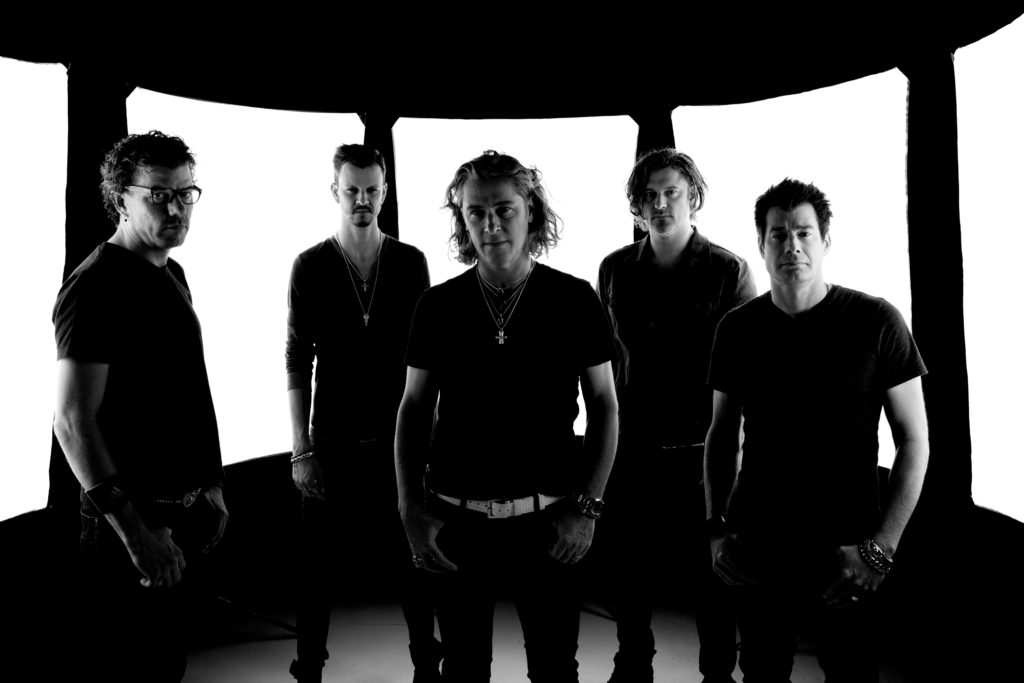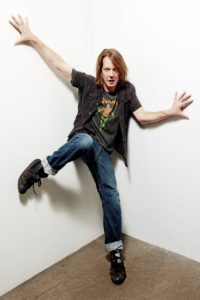
Soul Asylum and the band’s string of hits are often sloppily lumped into the Seattle sound movement of the 1990s. Dave Pirner and the original lineup first formed in Minneapolis circa 1981, nearly a decade before anyone had smelled like Teen Spirit or stared up at a black hole sun. More punk than grunge, the band scored multi-platinum success on the backs of singles “Somebody To Shove,” “Black Gold,” and “Runaway Train,” and have continued to chug along on those runaway tracks as many of their peers have given up on music.
Constantly looking forward, Soul Asylum is out on the road as part of the Rock & Roll Express Tour with 3 Doors Down and Collective Soul. For a full set of dates, click here.
We recently sat down with Pirner to discuss how there are still surprises to be had on the road, the reason he has a “let’s see what happens” battle cry, and why he prefers band life to that of a solo artist.
TrunkSpace: Are you somebody who has that gypsy soul and looks forward to life on the road?
Pirner: Well, unfortunately yes, I do have… there’s gotta be gypsy in me somewhere, because there’s wanderlust. I’m very comfortable sleeping in a moving vehicle. Things like that. The other side of it is, it’s fucking war, you know? It certainly doesn’t get easier. I know what to expect, which is sometimes comforting and other times just like, “Oh god!” Predictable, I guess, is the word I’m looking for.
TrunkSpace: Do you still experience firsts when you go out on the road?
Pirner: Yeah. There’s always something. This winter we played during the Super Bowl and it was 10 below zero and it was just the biggest snowstorm and we’re playing outside. I was walking towards the stage and there was like a blizzard going on, on the stage, and I was like, “I’d really thought I’d seen it all, but here it is, something else.” So there’s always something out there that you’re just like, “Alright, well I never would have seen this happen if I didn’t come here.” So I guess it was worth it. Sometimes it’s a tragedy and sometimes it’s a tragic comedy, but it’s always something that you just thought, “Ugh, I’d thought I’d been through it all.” (Laughter)
TrunkSpace: Does your creative brain work on the road? Are you somebody who writes while touring the highways and byways?
Pirner: Yes and no. I carry Dictaphones around with me and I try to keep it portable as much as I can. But yeah, you’re on a crowded bus and you’re in public spaces all the time and there’s not a lot of opportunities to get some quality alone time.
TrunkSpace: You hear all of the time about how creative people – songwriters – have a hard time shutting down the creative brain. Is your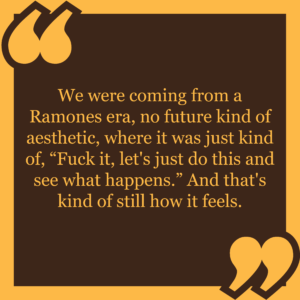 head always churning?
head always churning?
Pirner: Yeah. It can be annoying. And I like to quote Mitch Hedberg on this, because it’s just a perfect analogy to me. Mitch Hedberg, the great comedian from Minnesota, he goes, “Well, you know, I’m laying in my hotel room at night and I think of something and I have to decide whether I should get out of bed and go over to the desk and write it down or lay here and convince myself that it’s not funny.” And that’s the thing. I’ll get an idea in my head and I’m like, I got to record this, I got to write this down, or convince myself that it’s just not worth it. So that’s kind of going on all the time.
TrunkSpace: Because there’s always a chance that you could turn your back on a gem, right?
Pirner: I’m sure I’ve done it many, many, many times. That’s always in the back of your head. I lose a fucking Dictaphone and I’m like, “Oh, that’s the tape recording device that had the song that was really going to turn my life around and I lost it.”
TrunkSpace: On the opposite side of that coin, are you somebody who has to step away from music for periods of time to refuel the tank?
Pirner: Well, if touring is stepping away from music, yeah because it’s more visceral. You’re just cranking it out and I’m not really having a lot of opportunities to think about what comes next. You’re very frozen in a moment for two months, where you’re grinding it out and playing. It’s a shorter set, so you’ve got to play your stronger material. It’s always good to sort of… reckoning and stepping back and trying to see the big forest of trees, I think is kind of an innate part of songwriting.
TrunkSpace: The band first formed in ’81. Did you ever think that you’d be here all these years later, still discussing an entity that you created nearly 40 years ago?
Pirner: No. The modus operandi has been to keep your head down and go forward. I am not a nostalgic person at all. I don’t know what the Patti Smith line is… “I don’t fuck much with the past…”? It’s been a lot of that recently, because we’re re-issuing our first records – our first Twin/Tone records – and it’s a lot of trying to put all the pieces together as far as how we got to where we are. And man, it’s a crazy long trip that has been… I don’t even know what the right word is, but I learned a lot and I’m happy to be here and thankful that I can continue to do it.
We were coming from a Ramones era, no future kind of aesthetic, where it was just kind of, “Fuck it, let’s just do this and see what happens.” And that’s kind of still how it feels.
TrunkSpace: A living in the moment kind of thing?
Pirner: Yeah. It’s cool that we’ve been around long enough to have some interesting learning experiences. I tend to try to move forward.
TrunkSpace: It’s just got to be so interesting to look around and see how many of your peers the band has outlived, and beyond that, the clubs and venues themselves. So much has changed within the industry since you guys first started playing together.
Pirner: Yeah, it’s pretty hard core. You start to see the survivors and you start to realize that the people that were in it for all the right reasons are pretty much hanging on. The studio that I’m at in Minneapolis, is the first studio that we recorded at, and somehow, the owner managed to survive all this kind of stuff where studios were just dropping like flies all over the place, because of the new Pro Tools technology or whatever it is. And you find the same thing with clubs and club owners and… yeah, it’s a surprise when you walk into a club and it’s the same guy that you worked with 30 years ago. But you’re like, “Man, we made it. We made it through this and we’re still doing what we like to do.” That’s something because a lot of people just go, “No way. This is too much trouble.”
TrunkSpace: Is one of those reasons that you’re still doing it because you can’t be without it?
Pirner: Yeah, that would suck. I wouldn’t like that life so much.
TrunkSpace: You said that you’re not a nostalgic person, so in terms of a tour like this where, like you said, you’re putting your best material out there, do you long to get up on stage and play some of the new stuff that is sparking you creatively?
Pirner: Yeah. It’ll be exciting as far as stuff on our last record that we never could have played 10 years ago or 20 years ago. Playing it is a thrill. It’s not so much that I’m paying attention to whether or not the audience likes it, it’s just that I’m going, “Oh shit, I’ve never sang and played in this sort of rhythmic structure where I’m like, ‘Oh, I’m doing it. I’m tapping my head and rubbing my belly and singing at the same time to a whole new groove here and this is what I want to be doing, because what comes after this?’” I’m doing something that I couldn’t do before. And that is definitely exciting and definitely where I want to be going and what I want to be doing.
The other side of that is you go out and play a song, you play it 500 times, and it’s just very natural and there’s something to that also.
TrunkSpace: Plus those songs are generally greeted with such warmth from an audience and that must be a feeling that’s hard to duplicate.
Pirner: Yeah, and I know I’m not going to fuck it up. (Laughter) But you’re absolutely right. I can look out into a crowd and see a couple and their reaction between each other is relative to the music that we’re playing and I’m like, “Aww, they’re hugging during this song. This must be special.” I remember it just happened in Kansas City and I walked off stage and I looked at Winston (Roye) and I said, “Did you see that couple out in front there to your right?” And he’s like, “Yeah, I saw them.” And I’m like, “I bet you anything, they met at a Soul Asylum concert.” And he goes, “I bet you’re right.”
So there’s kind of charming elements to that.
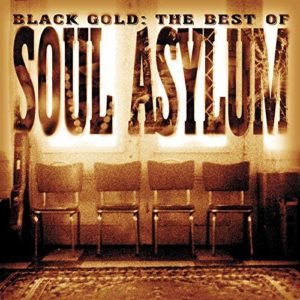 TrunkSpace: And that’s the wild part of music, what a song might mean to you can take on a completely different meaning to the listener when it finally reaches them.
TrunkSpace: And that’s the wild part of music, what a song might mean to you can take on a completely different meaning to the listener when it finally reaches them.
Pirner: Yeah. I always equated that with painting. Everybody sees something different in a painting and that’s the story behind “Runaway Train.” Once they put the video with the song, it changes people’s perception. I think that’s the beauty of it. And the situation of putting music videos to music… it’s a little disorienting and a little unfair somehow, because your visual becomes enhanced by this predetermined visual thing that doesn’t really have anything to do with the song.
TrunkSpace: The same kind of thing happens when a song winds up in a soundtrack. You start to connect the music to the film in a way that you don’t purposely set out to do.
Pirner: Oh yeah. We played at an After the Flood gig in North Dakota and we played “Ain’t No Sunshine” by Bill Withers and the kids went crazy. And I was like, “What the fuck? I don’t understand what they like and what they don’t like.” And then somebody said to me, “They used that song in a big movie this summer that all the kids went to.” So they were identifying with the song through the movie.
TrunkSpace: You released your first solo album in 2002. Is there another one in you?
Pirner: God, I don’t know. That was a whole new learning experience and what I’ve basically learned is that I want to be in a band. It was a challenge and if I make another solo record, it’ll be because someone in the band died or something. It’ll just be a thing that will happen, not because I particularly want it to happen, but I’m still going to put a record out.
TrunkSpace: Did you just find the experience too solitary… too detached?
Pirner: Yeah. Well, it was all on me so it didn’t really matter what the player’s opinion was, because a lot of them were just hired guns and they were there to do whatever I told them to do. So when you’re traveling with a group of four musicians, I know it’s not the same for everybody, but I want input. I want the whole band to feel responsible for deciding to put that song on the record and not that song. And I want the band to be responsible for not complaining too late. Say something before. If you never ever want to go to Timbuktu ever again, you got to tell people that. Don’t come to Timbuktu and go, “I hate this fucking town,” because no one wants to hear it because there’s this commiserating thing that you either have to put on your big man pants and just do it or sit around and second guess everything.
So yeah, I just like the feeling of a team and a band. There’s only seven of us, I think, going out this summer. And that’s my family. That’s my team. I don’t want to do that by myself. It has to be an organization that is going to support each other.
TrunkSpace: Again, we know you said you’re not a nostalgic person, but if you could sit down with your younger self, the you that was first drawn to music, would he be surprised by the way your career and musical focus has gone?
Pirner: Yeah, I think so. I think I returned to New Orleans with all my fascination with music, and jazz music particularly, and none of it was relative to a job in music. I was pretty much raised to believe that that was not possible. So, I don’t know what I would tell me. Do I care that I dropped out of college to play music? So far so good. But, I don’t know what else I would do, so that’s a little scary. But it really does sound really corny, “Follow your dreams, man,” because you never know what’s going to happen. But it could have turned out so much worse for me. I could be dead.
Pirner is not dead. In fact, he and Soul Asylum are out on the road with 3 Doors Down and Collective Soul. For full dates, click here.


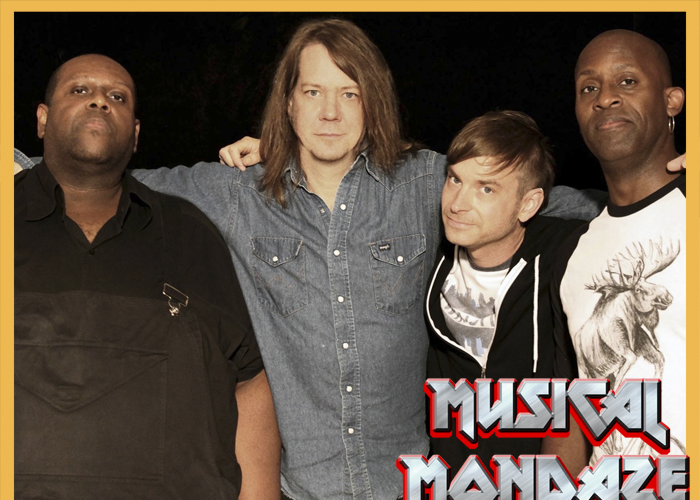

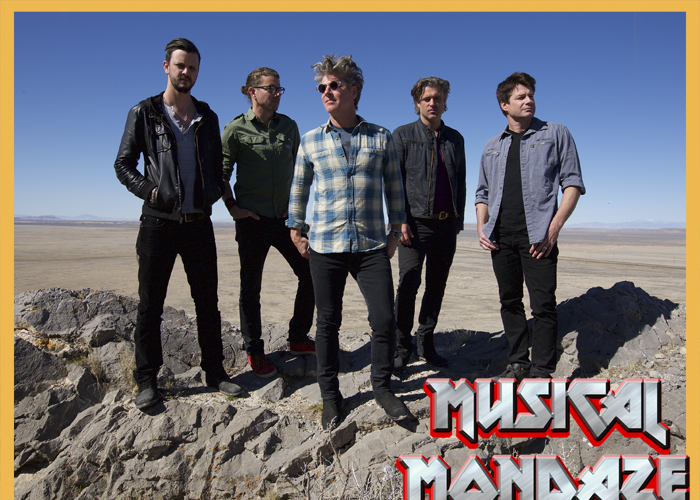
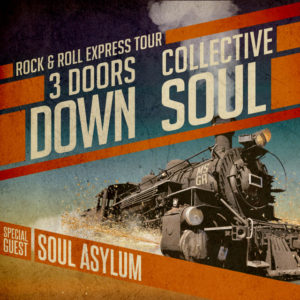 With hit songs like “Shine,” “Gel,” and “The World I Know,” Collective Soul helped to solidify the identity of the alternative rock scene of the mid to late 1990s, and while the lineup has experienced its share of changes throughout the years, the band’s signature sound has remained intact. With the Rock & Roll Express Tour set to kick off in early July alongside 3 Doors Down and Soul Asylum, the multi-platinum hit makers are excited to once again look out at amphitheaters filled with people singing along with them, this time until the final dog days of summer.
With hit songs like “Shine,” “Gel,” and “The World I Know,” Collective Soul helped to solidify the identity of the alternative rock scene of the mid to late 1990s, and while the lineup has experienced its share of changes throughout the years, the band’s signature sound has remained intact. With the Rock & Roll Express Tour set to kick off in early July alongside 3 Doors Down and Soul Asylum, the multi-platinum hit makers are excited to once again look out at amphitheaters filled with people singing along with them, this time until the final dog days of summer.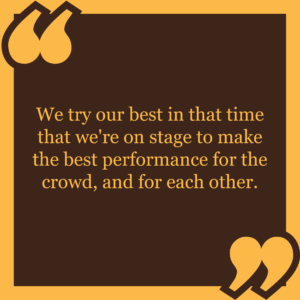 saying the other guys don’t, I just know that myself, I do the age old thing of getting a trainer for a little bit, then all of the sudden the tour happens, and I’m lounging around. (Laughter) But a little bit more to the story, I just try to bring a jump rope out, I’ll try to jog when I can. I’ll try to do some of the stuff I can do on the road to keep in shape. Then the drums, I’m not going to say they help my belly, but they definitely help cardio and stuff like that.
saying the other guys don’t, I just know that myself, I do the age old thing of getting a trainer for a little bit, then all of the sudden the tour happens, and I’m lounging around. (Laughter) But a little bit more to the story, I just try to bring a jump rope out, I’ll try to jog when I can. I’ll try to do some of the stuff I can do on the road to keep in shape. Then the drums, I’m not going to say they help my belly, but they definitely help cardio and stuff like that.